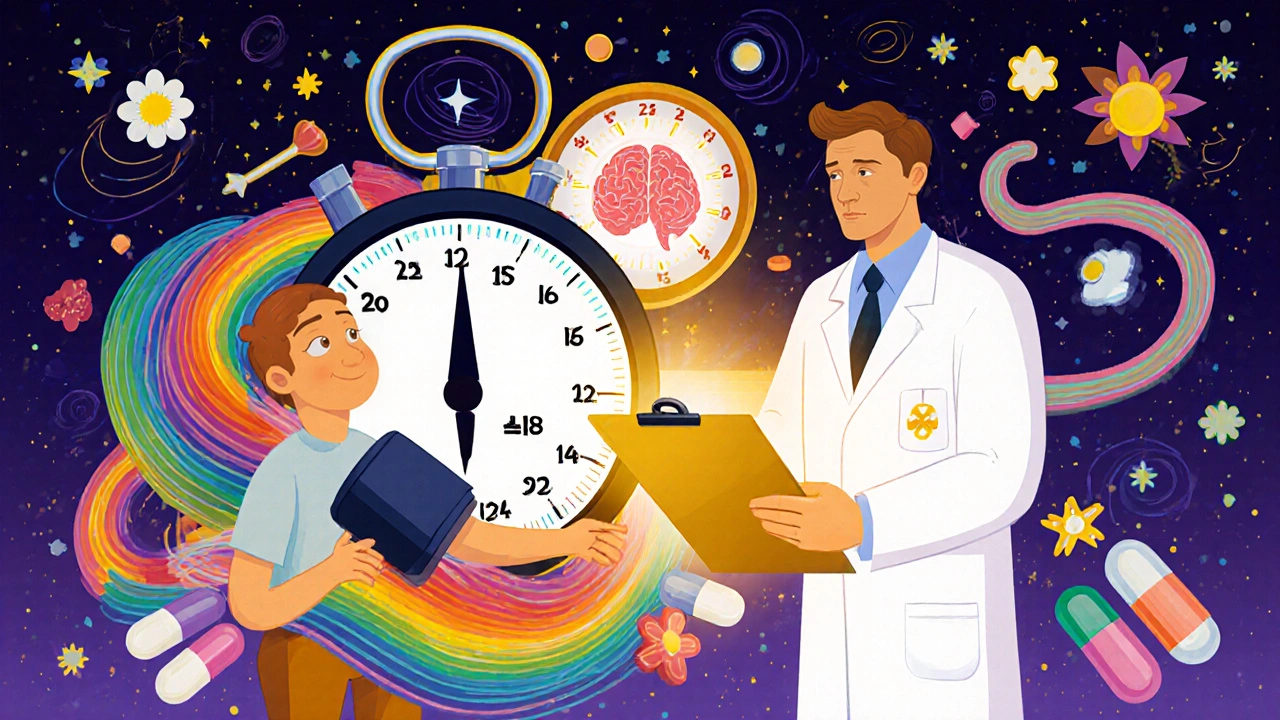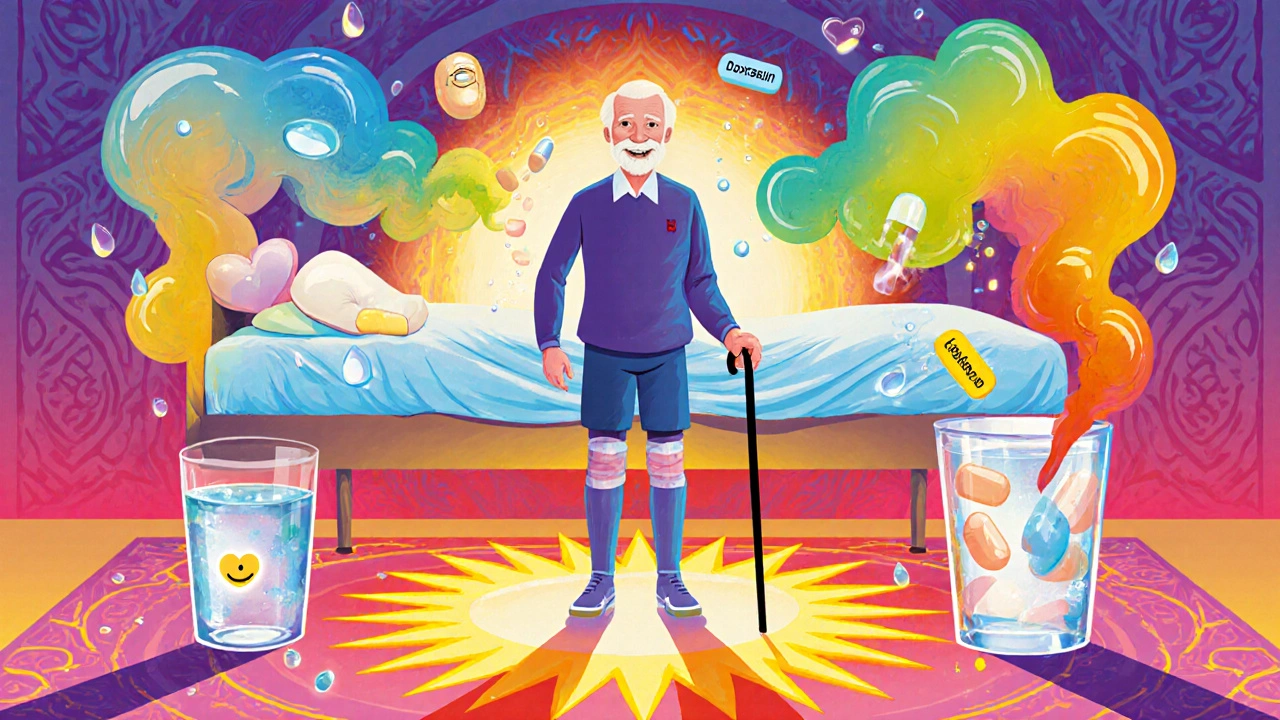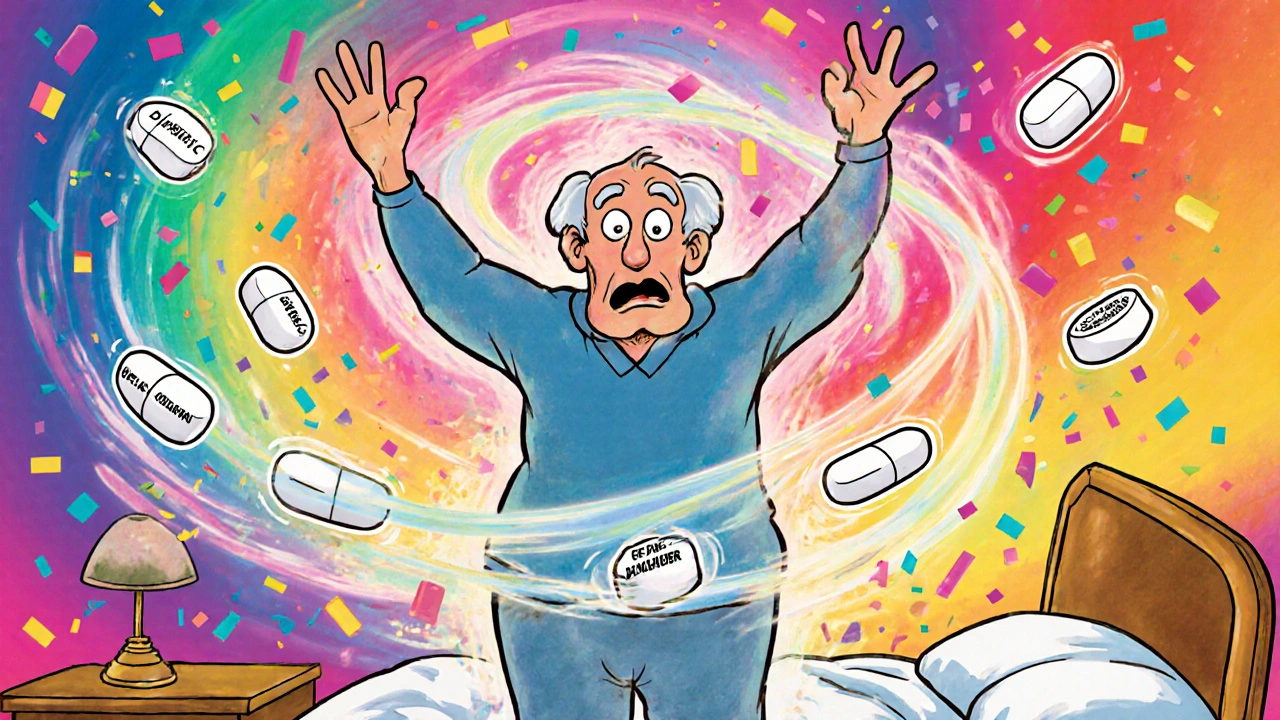30 Oct 2025
- 9 Comments
Standing up too fast and feeling like the room is spinning? That dizzy spell isn’t just bad luck-it could be your medications. Orthostatic hypotension, or low blood pressure when standing, is one of the most common but overlooked side effects of prescription drugs. It’s not rare. In fact, up to 30% of older adults taking multiple medications experience it. And while it might seem harmless, this drop in blood pressure can lead to falls, fainting, and even long-term health risks.
What Exactly Is Orthostatic Hypotension?
Orthostatic hypotension happens when your blood pressure drops suddenly after standing up. The medical definition is clear: a drop of 20 mm Hg in systolic pressure or 10 mm Hg in diastolic pressure within three minutes of standing. That’s not a small fluctuation-it’s enough to reduce blood flow to your brain, causing dizziness, blurred vision, or worse, a fall.It’s not just about getting up too fast. Your body normally adjusts when you stand: your heart beats faster, your blood vessels tighten, and your veins squeeze to keep blood flowing upward. But when medications interfere with that system, things go wrong. The result? You feel lightheaded, weak, or like you’re about to pass out.
Which Medications Cause Dizziness on Standing?
Not all drugs cause this-but many do. The most common culprits fall into a few key categories:- Antihypertensives: Blood pressure meds like diuretics (hydrochlorothiazide), ACE inhibitors (lisinopril), and beta-blockers are designed to lower blood pressure. But sometimes, they lower it too much when you stand. Studies show diuretics alone increase OH risk by nearly 2-fold.
- Alpha-blockers: Used for prostate issues and high blood pressure, drugs like doxazosin and tamsulosin relax blood vessels. They’re notorious for causing OH-up to 2.8 times higher risk compared to other meds.
- Tricyclic antidepressants: Medications like amitriptyline and nortriptyline affect the nervous system and can blunt the body’s ability to maintain blood pressure. Risk jumps by over 3 times in older patients.
- Antipsychotics: Clozapine, quetiapine, and chlorpromazine are among the worst offenders. Up to 40% of patients on higher doses report dizziness on standing. One Reddit user described fainting twice after starting quetiapine, with blood pressure dropping from 128/82 to 92/61 in under two minutes.
- Opioids: Morphine, oxycodone, and hydrocodone can cause OH in 15-25% of elderly users. The risk spikes even more when combined with alcohol or benzodiazepines-up to 2.3 times higher.
- Parkinson’s meds: Levodopa, used to treat tremors and stiffness, causes OH in 30-50% of patients. It’s not the disease-it’s the treatment.
Here’s the kicker: many people are on four or more medications. That multiplies the risk. Patients taking four or more drugs have over 5.7 times higher risk of orthostatic hypotension than those on one or two.
Why Do Some People Get It and Others Don’t?
It’s not random. Certain factors make you more vulnerable:- Age: Over 70? Your risk is 3.2 times higher than someone under 50. As you age, your blood vessels stiffen, your heart doesn’t respond as quickly, and your nervous system slows down.
- Dehydration: Not drinking enough water makes your blood volume drop. Diuretics make this worse.
- Diabetes or Parkinson’s: These conditions damage the autonomic nervous system, which controls blood pressure regulation.
- Long periods of bed rest: If you’ve been sick or inactive, your body loses its ability to adjust quickly to standing.
And here’s something most people don’t realize: up to 40% of people with orthostatic hypotension have no symptoms. They’re walking around with dangerously low blood pressure when standing-and don’t know it. That’s why screening matters.

How Is It Diagnosed?
Your doctor doesn’t just ask if you feel dizzy. They measure your blood pressure properly:- Rest in a lying position for 5 minutes.
- Take your blood pressure.
- Stand up slowly.
- Measure again at 1, 2, and 3 minutes after standing.
If your systolic pressure drops by 20 mm Hg or more, or your diastolic drops by 10 mm Hg or more, and you feel dizzy at the same time-you’ve got medication-induced orthostatic hypotension. The timing matters. If you check too early or too late, you’ll miss it.
Many patients report symptoms for two months or longer before their doctor connects the dots. That’s too long. If you’re dizzy when standing, say something. Bring your full med list. Don’t assume it’s just aging.
What Can You Do About It?
The good news? Medication-induced orthostatic hypotension is often reversible. Here’s what works:- Review your meds: Work with your doctor to identify high-risk drugs. Sometimes, switching to a safer alternative helps. For example, ziprasidone causes OH in only 5-10% of users, while clozapine hits 35-45%. That’s a big difference.
- Slow down: When getting up, sit on the edge of the bed for 30 seconds first. Then stand slowly. Don’t rush. Use a cane or handrail if needed.
- Drink more water: Aim for 2-2.5 liters per day. Hydration increases blood volume and helps stabilize pressure.
- Wear compression stockings: These squeeze your legs and help blood flow back to your heart. They’re simple, cheap, and surprisingly effective.
- Avoid alcohol and large meals: Both can drop your blood pressure further.
- Elevate the head of your bed: Slightly raising the head of your bed by 6-10 inches helps your body retain fluid overnight and reduces morning dizziness.
One patient in Cleveland Clinic’s forums shared that after removing hydrochlorothiazide, her OH symptoms vanished in just 72 hours. That’s the power of a simple change.

When Medication Adjustment Isn’t Enough
If lifestyle changes don’t help, doctors may turn to medication. The American Heart Association now recommends midodrine as a first-line treatment for persistent cases. It’s a drug that tightens blood vessels, helping raise standing blood pressure. In clinical trials, it reduced symptoms by 65%. But it’s not for everyone-it can cause high blood pressure when lying down, so timing matters.Other options include fludrocortisone (to retain salt and water) or droxidopa (for neurogenic OH). But these are usually reserved for severe cases. The goal is always to fix the root cause: the offending drug.
Why This Matters More Than You Think
This isn’t just about feeling dizzy. Orthostatic hypotension increases your risk of:- Falls: Up to 30% higher risk-a leading cause of injury in older adults.
- Bone fractures: Hip fractures from falls can be life-altering.
- Cognitive decline: Repeated drops in brain blood flow may contribute to memory problems.
- Mortality: People with OH have a 24-32% higher risk of dying over 10 years compared to those without it.
And the economic cost? OH-related falls cost Medicare $31 billion annually. About 30-40% of those are tied to medications.
That’s why the American Geriatrics Society now lists 12 high-risk drugs in its Beers Criteria-and why 82% of geriatric clinics now screen for OH routinely. It’s becoming standard care.
What You Should Do Today
If you or someone you care about is on medications and feels dizzy when standing:- Write down all your medications-including supplements and over-the-counter drugs.
- Track when dizziness happens: Is it right after standing? After eating? After taking a pill?
- Ask your doctor: "Could any of my meds be causing this?"
- Don’t stop meds on your own. But do bring up the issue. Many cases improve with simple changes.
Medication-induced orthostatic hypotension is common, preventable, and often fixable. You don’t have to live with dizziness. With the right review and adjustments, you can stand up without fear.
Can orthostatic hypotension go away on its own?
Yes, in many cases-especially when it’s caused by medications. If you stop or adjust the drug causing the problem, symptoms often improve within days to weeks. One study showed 70-85% of patients saw relief after changing their meds. But if the dizziness is due to nerve damage from diabetes or Parkinson’s, it’s less likely to resolve without treatment.
Is orthostatic hypotension dangerous?
It can be. While dizziness might seem minor, the real danger is falling. Falls cause fractures, head injuries, and hospitalizations. People with orthostatic hypotension also have a 24-32% higher risk of death over 10 years. That’s why it’s not just a nuisance-it’s a serious health signal.
Can I still take my blood pressure medicine if I get dizzy?
Don’t stop it without talking to your doctor. High blood pressure is dangerous too. But your doctor can adjust the dose, switch to a different class of drug, or change the timing. For example, taking a diuretic in the morning instead of evening can help reduce nighttime dizziness. The goal is to control your blood pressure without causing dizziness when standing.
How do I know if my dizziness is from meds or something else?
If the dizziness happens only when you stand up-especially after starting a new drug-it’s likely medication-related. Other causes like inner ear problems or heart rhythm issues usually cause dizziness regardless of position. A simple blood pressure check while lying and standing will tell your doctor. If your pressure drops more than 20/10 mm Hg within 3 minutes, it’s orthostatic hypotension.
Are there any natural remedies that help?
Yes, but they’re supportive, not replacements. Drinking more water, wearing compression socks, avoiding alcohol, and standing up slowly are proven strategies. Some people find adding a little more salt to their diet helps-but only if they don’t have heart or kidney problems. Always check with your doctor before making dietary changes.


Leslie Schnack
November 1, 2025I never realized how many meds cause this until I started tracking my grandma's dizziness. She was on five drugs, and switching her diuretic from HCTZ to chlorthalidone cut her episodes in half. Simple fix, but no one ever asked her about it until she fell in the bathroom.
Now she sits for 30 seconds before standing, drinks water like it's her job, and wears those compression socks like they're fashion. No more ER visits.
Hazel Wolstenholme
November 2, 2025How quaint. You treat orthostatic hypotension as if it’s a mere inconvenience, when in reality it’s a physiological indictment of modern polypharmacy-a grotesque symphony of pharmaceutical overreach, where clinicians prescribe like they’re playing Jenga with human homeostasis.
And yet, you offer ‘compression socks’ as a solution? A Band-Aid on a severed artery. The real fix is deprescribing, not accessorizing. The Beers Criteria exists for a reason, and yet, 87% of geriatricians still prescribe alpha-blockers for BPH without even blinking. Pathetic.
Matthew Kwiecinski
November 2, 2025Don't forget that opioids and benzodiazepines together are a death combo for OH. The data is clear. A 2022 JAMA study showed a 3.1x increase in syncope risk when both are used concurrently in patients over 65. Most doctors don't even check for concurrent prescriptions. They just refill.
Also, don't confuse OH with vertigo. One is vascular, the other is neurological. Mixing them up leads to wrong treatments. And yes, the 20/10 mmHg drop is the gold standard. No exceptions.
Justin Vaughan
November 3, 2025Listen-this isn’t just about meds. It’s about listening to your body. I used to tell my dad to ‘just stand up slower’ like it was a joke. Then he passed out at the grocery store and cracked his skull. That’s when I realized: dizziness isn’t ‘getting old,’ it’s your body screaming for help.
Start small: water first thing in the morning, sit up before standing, no coffee on an empty stomach. And if your doctor brushes you off? Get a second opinion. Your life isn’t a footnote in a chart.
You deserve to stand up without feeling like you’re gonna die. Seriously. It’s fixable. Don’t accept ‘it’s just aging.’
Manuel Gonzalez
November 4, 2025I’ve seen this in my elderly patients. The most surprising part? Many don’t even report it. They think it’s normal. One woman told me she’d been dizzy every morning for three years-just assumed it was ‘the way things were.’
Simple screening takes 5 minutes. Check BP lying, then standing. No fancy equipment. No cost. And yet, it’s skipped in 70% of primary visits. We’re missing so many cases because we assume symptoms are ‘just part of aging.’
Also, compression stockings work better than people think. They’re not glamorous, but they’re science.
Brittney Lopez
November 5, 2025This is such an important post. I’ve had two friends who fell because of this and didn’t realize it was their meds. One was on an old-school antidepressant and thought she was just ‘getting clumsy.’
Let’s normalize talking about this. If you’re dizzy when you stand, say something. Bring your pill bottle to your appointment. Write it down. Don’t be embarrassed. This isn’t weakness-it’s awareness.
And if you’re caring for someone older? Watch how they move. Ask them if they ever feel light-headed. You might save them from a hospital stay.
Jens Petersen
November 7, 2025Of course the medical establishment wants you to think this is ‘fixable’ with socks and water. It’s cheaper than admitting that the entire drug approval system is broken.
They approved clozapine knowing it causes OH in 40% of patients, then sold it as a ‘last-resort’ miracle drug. Meanwhile, patients are told to ‘just stand slower.’
This isn’t medicine-it’s corporate triage. They profit from the fall, the fracture, the rehab. The system doesn’t want you well. It wants you managed.
And don’t even get me started on midodrine. It’s a vasoconstrictor with a 30% chance of supine hypertension. They’re treating symptoms with more toxins. Brilliant.
Dade Hughston
November 7, 2025OMG I JUST REALIZED MY DAD IS ON ALL THESE DRUGS AND HE FALLS EVERY TIME HE GETS UP TO GO TO THE BATHROOM I THINK HE MIGHT BE DYING OR SOMETHING I DONT KNOW WHAT TO DO I JUST WENT TO HIS HOUSE AND HE WAS LYING ON THE FLOOR AGAIN AND I THOUGHT HE WAS DEAD BUT HE WAS JUST DIZZY AND NOW IM SCARED I DONT KNOW IF I SHOULD CALL 911 OR WHAT I JUST WANT TO CRY
HE TOOK HIS MEDS AT 8PM AND GOT UP AT 2AM AND THEN HE WAS ON THE FLOOR AGAIN I THINK ITS THE TAMSULOSIN I SAW IT ON THE BOTTLE AND I READ THIS POST AND NOW IM TERRIFIED I THINK I SHOULD JUST MOVE IN WITH HIM OR SOMETHING PLEASE HELP ME IM SO STRESSED I CAN'T SLEEP
HE ALSO DRINKS COFFEE AND I THINK THAT MAKES IT WORSE BUT I DONT KNOW IF I SHOULD TAKE AWAY HIS COFFEE I DONT WANT TO BE A BAD DAUGHTER BUT I DONT WANT HIM TO DIE I JUST WANT HIM TO BE OKAY
PLEASE TELL ME WHAT TO DO I'M SO SCARED
Jim Peddle
November 8, 2025Let’s not pretend this is about medication safety. This is a distraction. The real issue is that the FDA and CDC have been quietly suppressing data on drug-induced orthostatic hypotension since the 90s because it implicates the entire pharmaceutical-industrial complex.
Why do you think midodrine is approved but not the safer alternatives? Because the patents expired. Why do you think doctors still prescribe alpha-blockers for BPH? Because they’re cheap, and the reps still visit.
The 30% statistic? Probably underreported. The real number is closer to 50% in institutionalized elderly. They’re not dying from falls-they’re dying from corporate negligence.
And you want to tell people to drink water? Cute. The system is rigged. Wake up.